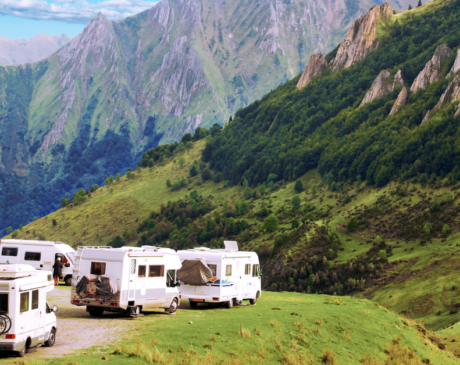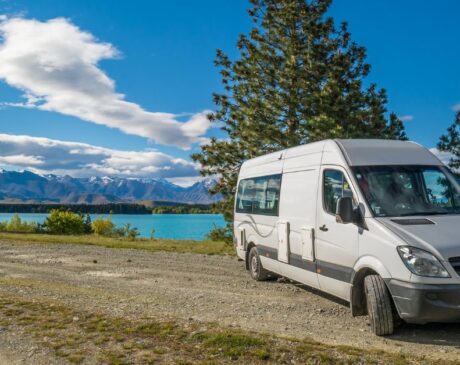Motorhome vs. Campervan: Which is Better for Travel?
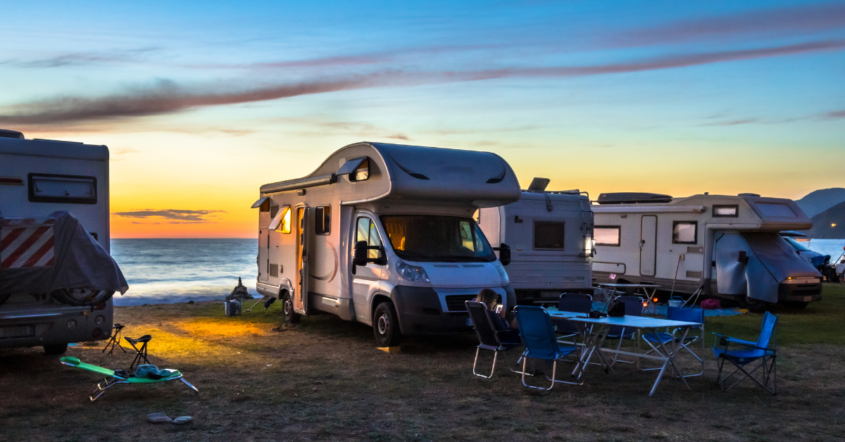
When it comes to embarking on a journey of exploration and adventure, the choice between a motorhome and a campervan is a pivotal decision that can significantly influence your travel experience.
Both these recreational vehicles offer unique advantages and cater to distinct preferences, making it essential for prospective travelers to weigh the pros and cons before making a commitment.
In this comprehensive analysis, we delve into the intricacies of motorhomes and campervans, exploring various aspects such as size, maneuverability, amenities, and cost to help you make an informed decision tailored to your travel aspirations.
1. Size Matters:
The primary distinction between a motorhome and a campervan lies in their size. Motorhomes, often referred to as RVs (Recreational Vehicles), are larger and more spacious, resembling a small home on wheels.
Campervans, on the other hand, are compact and generally built on a standard van chassis. Size plays a crucial role in determining the comfort and convenience levels during your travels.
Motorhomes
Motorhomes come in various sizes, ranging from Class A, Class B, to Class C. Class A motorhomes are the most spacious, resembling a bus-like structure, while Class B motorhomes are more compact and Class C motorhomes are a mid-sized option.
The generous space in motorhomes allows for dedicated living spaces, separate bedrooms, and full-sized bathrooms, providing a more home-like feel on the road.
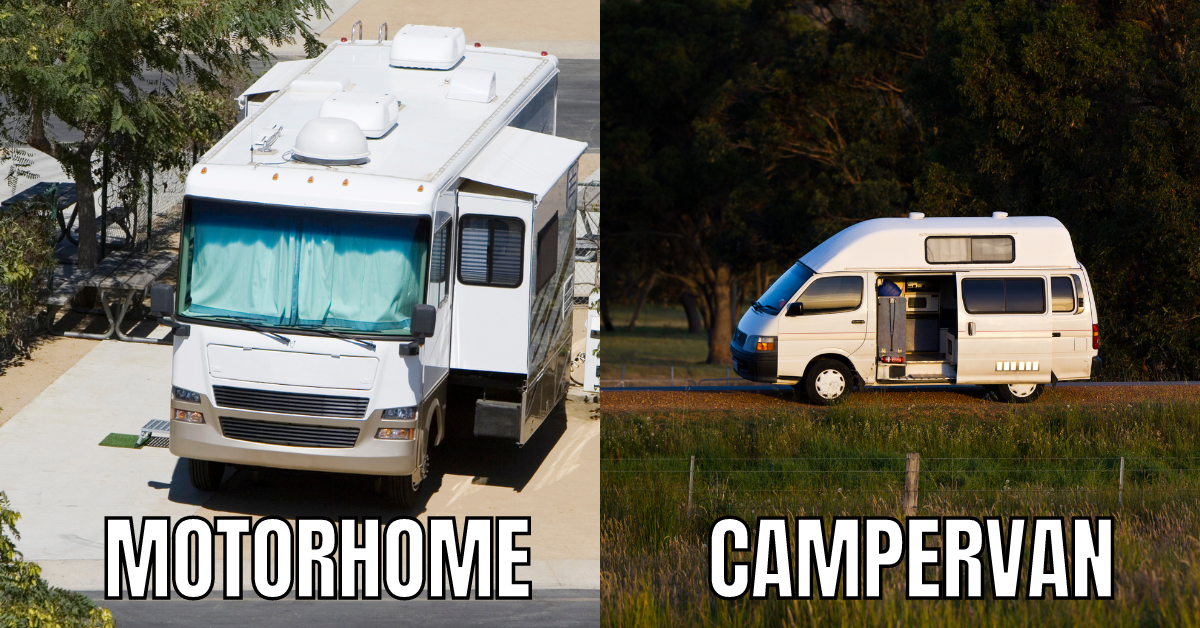
Campervans
Campervans, being smaller, are inherently more maneuverable and suitable for those who prefer a minimalist approach to travel.
While space is limited, campervans are designed to optimize functionality, often featuring foldable furniture and multifunctional spaces. The compact size allows for easy navigation through narrow roads and crowded campsites, providing a more intimate connection with your surroundings.
2. Maneuverability:
One of the key considerations for travelers is the ease of maneuverability, especially when navigating through diverse terrains and tight spaces.
The choice between a motorhome and a campervan significantly impacts how seamlessly you can explore various destinations.
Motorhomes
Due to their larger size, motorhomes can pose challenges when it comes to maneuvering through narrow streets, sharp turns, or crowded campsites.
Class A motorhomes, in particular, may require more planning and strategic driving, limiting accessibility to certain areas. However, Class B and Class C motorhomes offer a compromise, providing a balance between space and maneuverability.
Campervans
Campervans shine in terms of maneuverability. Their compact size allows for easy navigation through urban areas, winding roads, and tight parking spaces.
Campervans are the preferred choice for those who seek the freedom to explore off-the-beaten-path locations without the constraints of a larger vehicle. This enhanced maneuverability contributes to a more spontaneous and adventurous travel experience.
3. Amenities and Comfort:
The amenities and comfort level provided by a motorhome or campervan play a pivotal role in shaping the overall travel experience.
Understanding the features each option offers is essential for aligning your preferences with your travel goals.
Motorhomes
Motorhomes are synonymous with luxury on the road. Depending on the class, they can include features such as full kitchens, spacious dining areas, entertainment systems, and even slide-out sections to expand living space when parked.
Class A motorhomes, in particular, offer a level of comfort akin to a home, making them suitable for extended vacations or full-time living.
Campervans
While campervans may lack the expansive features of motorhomes, they are designed to maximize the use of limited space.
Campervans typically include a compact kitchenette, sleeping quarters, and a basic bathroom setup. The emphasis is on efficiency and functionality, catering to those who prioritize a minimalist lifestyle during their travels. Campervans are ideal for individuals or couples looking for a more intimate and practical living space.
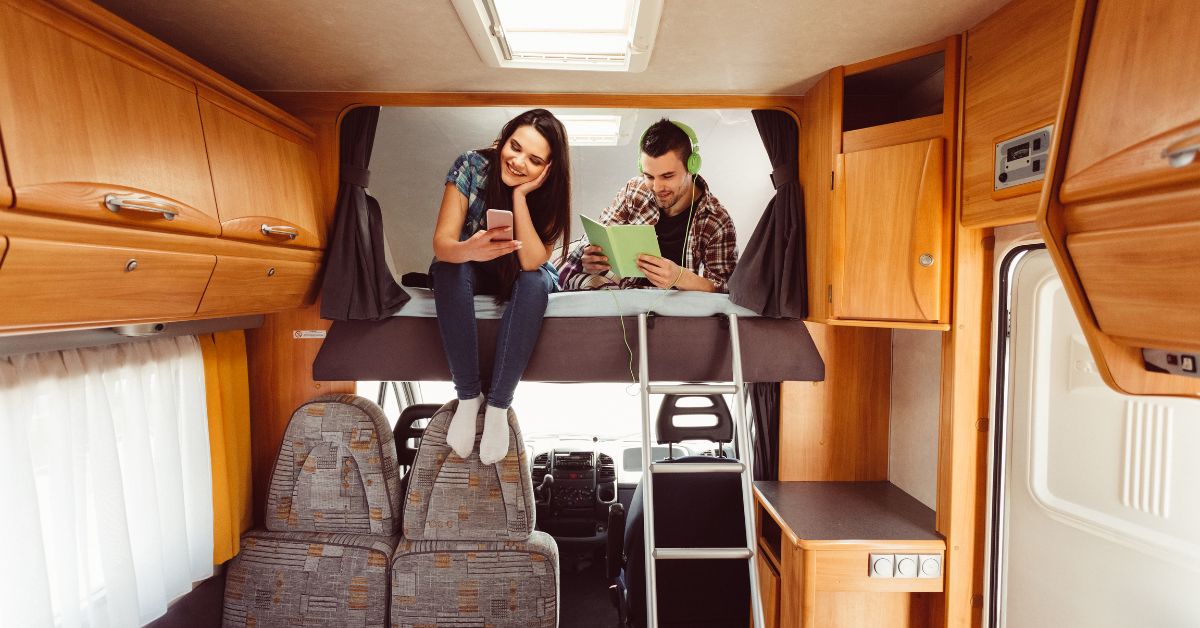
4. Cost Considerations:
Budget plays a crucial role in determining the feasibility of your travel plans. The initial cost, maintenance expenses, and fuel efficiency are significant factors to consider when deciding between a motorhome and a campervan.
Motorhomes
Larger Class A motorhomes, especially, come with a higher upfront cost. Additionally, the ongoing maintenance expenses, storage fees, and fuel consumption can contribute to a substantial overall investment.
However, for those seeking a luxurious and spacious home on wheels, the expense may be justifiable.
Campervans
Campervans are generally more budget-friendly in terms of both upfront costs and ongoing expenses. Their smaller size translates to better fuel efficiency, and maintenance costs are often lower compared to motorhomes.
Campervans are an attractive option for budget-conscious travelers who prioritize a more economical approach to their adventures.
5. The Versatility:
Motorhomes
Versatility in the context of motorhomes often means having dedicated spaces for various activities. Class A motorhomes, with their spacious interiors, offer the flexibility to entertain guests, cook elaborate meals, and unwind in comfort.
This versatility is especially attractive for those planning extended trips where the motorhome serves as a home base.
Campervans
Campervans redefine versatility by embracing a minimalist philosophy. The compact design encourages a fluid transition between living, cooking, and sleeping spaces.
The simplicity of campervans appeals to those who value adaptability, allowing them to easily switch between on-the-go exploration and cozy downtime.
6. Storage Considerations:
Motorhomes
Size brings storage abundance in motorhomes. Ample cabinets, closets, and under-floor compartments cater to the needs of long-term travelers.
Whether you’re a minimalist or a pack-rat, a motorhome provides the luxury of bringing along all the essentials and then some.
Campervans
Limited space calls for strategic packing in campervans. The emphasis is on essential items, and creative storage solutions become paramount.
Campervan enthusiasts master the art of maximizing every inch, ensuring they have the necessities without sacrificing valuable living space.
7. Connectivity on the Road:
Motorhomes
The larger size of motorhomes often accommodates more advanced entertainment systems and connectivity options.
Class A motorhomes, in particular, might boast features like satellite TV, home theater setups, and robust internet connectivity.
For those who wish to stay connected with the world while on the road, motorhomes offer a tech-friendly environment.
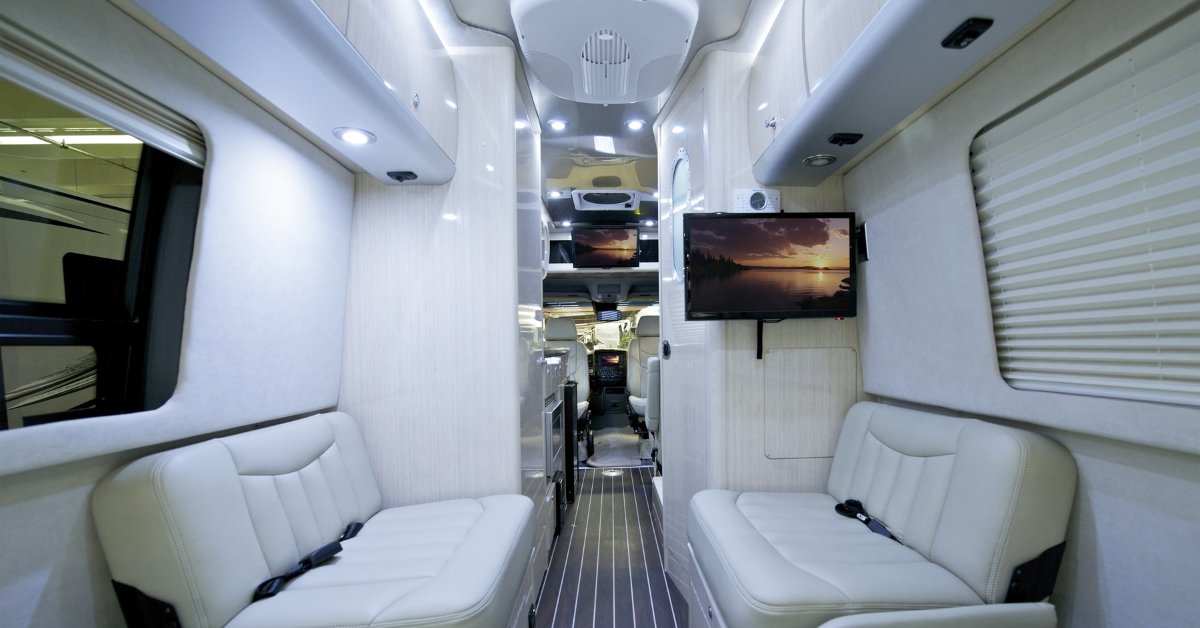
Campervans
Campervans, being more modest in size, may have simpler entertainment setups. However, this aligns with the ethos of a campervan adventure – embracing the journey and surroundings rather than the screen.
Connectivity is often basic, encouraging a digital detox and a deeper connection with nature.
8. Environmental Impact:
Motorhomes
The size and weight of motorhomes contribute to higher fuel consumption. While advancements in technology aim to improve fuel efficiency, it remains a consideration for environmentally conscious travelers.
Class B and Class C motorhomes, being more compact, tend to be more fuel-efficient compared to their larger counterparts.
Campervans
Campervans, with their smaller size and lighter weight, generally have a lower environmental impact. Their fuel efficiency is an attractive feature for eco-conscious travelers looking to minimize their carbon footprint.
Campervans align with the principles of sustainable and responsible travel.
9. Customization Options:
Motorhomes
Motorhomes, particularly Class B and Class C, offer a degree of customization. From interior layouts to exterior features, owners often have the flexibility to tailor their motorhome to suit their preferences.
This personal touch adds a sense of ownership and individuality to the motorhome lifestyle.
Campervans
Campervans, due to their compact nature, may have fewer customization options compared to motorhomes.
However, the DIY spirit is strong in the campervan community. Many owners undertake modifications to optimize space, enhance functionality, and add personal touches that reflect their unique style.
10. Resale Value:
Motorhomes
The resale value of a motorhome can be influenced by various factors, including brand reputation, maintenance history, and overall condition.
While Class A motorhomes may depreciate more rapidly than Class B or Class C models, a well-maintained motorhome can retain a reasonable resale value.
Campervans
Campervans, often being more affordable upfront, may experience slower depreciation. Their popularity among a diverse range of travelers contributes to sustained demand in the used market.
A well-loved and well-maintained campervan can hold its value over time.
In Summation:
The decision between a motorhome and a campervan transcends mere size and comfort preferences. It encapsulates a lifestyle choice, aligning with your values, aspirations, and the type of journey you envision.
Whether you’re enticed by the spacious luxury of a motorhome or drawn to the nimble simplicity of a campervan, your choice becomes an integral part of your travel narrative.
The road ahead beckons, promising adventure, discovery, and a myriad of experiences. As you weigh the pros and cons of motorhomes and campervans, envision the kind of traveler you aspire to be and the stories you aim to create.
In the end, the best travel companion is the one that resonates with your soul and fuels your wanderlust. Happy travels, wherever the road may lead!

